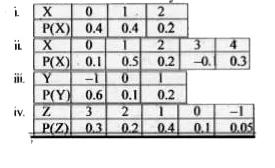Let A and B be independent events with P(A) = 0.3 and P(B) 0.4. Find
i. P(A∩B) ii.P(A∪B) iii. P(A|B) iv. P(B|A)Solution in Tamil
The correct Answer is:i. 0.12, ii. 0.58, iii. 0.3, and iv. 0.4
Step by step video, text & image solution for Let A and B be independent events with P(A) = 0.3 and P(B) 0.4. Find i. P(AnnB) ii.P(AuuB) iii. P(A|B) iv. P(B|A) by Maths experts to help you in doubts & scoring excellent marks in Class 12 exams.
Topper's Solved these Questions
- BOOK - NEW JOYTHI PUBLICATIONCHAPTER - PROBABILITYEXERCISE - SOLUTIONS TO NCERT TEXT BOOK EXERCISE 13.314videos
PROBABILITY
- BOOK - NEW JOYTHI PUBLICATIONCHAPTER - PROBABILITYEXERCISE - SOLUTIONS TO NCERT TEXT BOOK EXERCISE 13.417videos
PROBABILITY
- BOOK - NEW JOYTHI PUBLICATIONCHAPTER - PROBABILITYEXERCISE - SOLUTIONS TO NCERT TEXT BOOK EXERCISE 13.117videos
PROBABILITY
- BOOK - NEW JOYTHI PUBLICATIONCHAPTER - PRINCIPLES OF MATHEMATICAL INDUCTIONEXERCISE - QUESTIONS FROM COMPETITIVE EXAMS4videos
PRINCIPLES OF MATHEMATICAL INDUCTION
- BOOK - NEW JOYTHI PUBLICATIONCHAPTER - RELATIONS AND FUNCTIONS EXERCISE - QUESTIONS FROM COMPETITIVE EXAMS33videos
RELATIONS AND FUNCTIONS
Similar Questions
An urn contains 5 red and 5 black balls. A ball is draw at random, its colour is noted and is returned to the urn. Moreover, 2 additional balls of the colour drawn are put in the urn and then a ball is drawn at random. What is the probability that the second ball is red?
02:20View SolutionState which of the following are not the probability distributions of a random variable. Give reasons for your answer.
 03:13View Solution
03:13View SolutionGiven that E and F are events such that P(E)= 0.6, P(F) = 0.3 and P(E∩F)=0.2, find P(E|F) and P(F|E)
03:51View Solution10n+3(4n+2)+5 is divisible by (n∈N)
04:00View SolutionIf x≠1 and f(x)=x+1x−1 is a real function then fff (2) is
08:01View SolutionLet A and B be independent events with P(A)=0.3and P(B)=0.4Find(i) P(A∩B) (ii) P(A∪B)(iii) P(A∣B) (iv) P(B∣A)
02:47View SolutionIf A and B are independent events such that P(A)=0.3 and P(B)=0.5, then find the values of:
(i) P(A∩B) (ii) P(A∪B)
(iii) P(A/B) (iv) P(B/A)03:00View Solutionमान लें A और B स्वतंत्र घटनाएं है तथा P(A)=0.3 और P(B)=0.4. तब
(i) P(A∩B) (ii) P(A∪B)
(iii) P(A∣B) (iv) P(B∣A)ज्ञात कीजिए।04:28View Solutionमान लें A और B स्वतंत्र घटनाएँ है तथा P(A)=0.3 और P(B)=0.4 तब
(i) P(A∩B)
(ii) P(AUB)
(iii) P(A∣B)
(iv) P(B∣A) ज्ञात कीजिए |00:36View SolutionGiven P(A)=0.4 and P(A∪B)=0.7. Find P(B) if (i) A and B are mutually exclusive (ii) A and B are independent events (iii) P(A/B)=0.4, (iv) P(B/A)=0.5
03:32View SolutionIf P(A) = 0.8, P(B) = 0.5 and P(B|A) = 0.4 Find i. P(A∩B) ii. P(A|B) iii. P(A∪B)
View SolutionLet A and B be independent events with P(A) = 0.3 and P(B) = 0.4. Find
(i) P(A∩B) (ii) P(A∪B)
(iii) P(A|B) (iv) P(B|A)03:33View SolutionLet A and B be independent events with P(A) = 0.3 and P(B) = 0.4. Find
(i) P(A∩B) (ii) P(A∪B)
(iii) P(A|B) (iv) P(B|A)01:40View SolutionLet A and B be independent events with P(A) = 0 . 3 and P(B) = 0 . 4, . Find
P(A∩B)02:51View SolutionLet A and B be independent events with P(A) = 0.3 and P(B) = 0.4. Find
(i) P(A∩B) (ii) P(A∪B)
(iii) P(A|B) (iv) P(B|A)04:29View Solution

